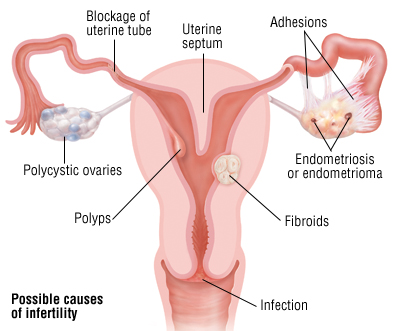Infertility
Infertility and Its Causes, Diagnosis, Treatments
What is Infertility ?
“Infertility refers to an inability to conceive after having regular unprotected sex. Infertility can also refer to the biological inability of an individual to contribute to conception, or to a female who cannot carry a pregnancy to full term”.
Infertility is defined as unable to get pregnant after one year of unprotected sex. Women who do not have regular menstrual cycles, or are older than 35 years and have not conceived during a 6-month period of trying, should think making an appointment with an infertility specialist. These doctors may also be able to help women with recurrent pregnancy loss or more spontaneous miscarriages.
Causes Of Infertility
- Endometriosis
- Tubal occlusion
- Endometrial polyps
- Ovulation disorders
- Advancing maternal age
- Uterine fibroids
- Malefactors affecting sperm function: Male factor infertility
Treatment
Infertility treatment depends on:
What’s causing the infertility
- Your age and your partner’s age
- How long period you’ve been infertile
- Personal preferences
Some causes of infertility cannot be corrected.
In cases, where spontaneous pregnancy doesn’t happen, couples can often still get a pregnancy through use of assisted reproductive technology. Infertility treatment may include significant financial, physical, psychological and time commitments.
Treatment for men
Men’s options can include treatment for common sexual problems or lack of healthy sperm. Treatment may contain:
Changing lifestyle factors: Improving lifestyle and behavioral factors can get better chances for pregnancy, including discontinuing select medications, frequency and timing of intercourse, reducing/eliminating harmful substances, improving establishing daily work out, and optimizing other factors that may otherwise impair fertility.
Medications: Certain medications may recover a man’s sperm count and likelihood for achieving a successful pregnancy. These medicines may increase testicular function, including sperm production and quality.
Surgical Process: In select situation, surgery may be able to reverse a sperm blockage and restore fertility. In other cases, surgically repairing a varicocele may get better overall chances for pregnancy.
Retrieval of Sperm: These methods obtain sperm when ejaculation is a problem or when no sperm are there in the ejaculated fluid. They may also be used in cases where assisted reproductive techniques are planned and sperm counts are low or otherwise it is abnormal.
Treatment for women
Although a woman may need just one or two therapies to restore fertility, it’s possible that several various types of treatment may be required before she’s able to conceive.
Stimulating ovulation with fertility drugs: Fertility drugs are the most important treatment for women who are infertile because of ovulation disorders. These medications control or induce ovulation. Consult with your doctor about fertility drug options – including the benefits and risks of each type.
Intrauterine insemination (IUI): During IUI, healthy sperm are placed directly in the uterus around the time the woman’s ovary releases one or more eggs to be fertilized. Depending on the reasons for infertility, the timing of IUI can be coordinated with your normal cycle or with fertility medications.
Surgery to restore fertility. Uterine problems such as endometrial polyps, a uterine septum or intrauterine scar tissue can be treated with hysteroscopic surgery.
Diagnosis:
Some of the diagnosis tests are might be includes:
Test for men
- Genetic testing
- Testicular biopsy.
- Hormone testing
- Imaging
- Semen analysis
Test for women
- Ovulation Test
- Hysterosalpingography
- Ovarian reserve test
- Imaging tests
- Other hormone testing
- Hysteroscopy
- Laparoscopy
- Genetic testing



